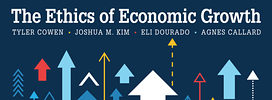I would like to thank all three discussants for their excellent and thoughtful contributions.
Joshua Kim asks me to get more specific. I would note I have written about more specific policy topics than almost any other economist who has lived, and that is on my blog Marginal Revolution, and also earlier for The New York Times and now Bloomberg Opinion. Stubborn Attachments was my chance (for a change!) to be more abstract and philosophical, but odds are I have covered a given specific topic elsewhere and in a searchable fashion. More generally, the existence of the internet and Google should make our books much more streamlined, and less concerned with all of the specifics, at least provided we are filling in the gaps elsewhere.
On education, I would stress to Joshua that wise investments in education should also be expected to boost the economic growth rate, so the tension there between growth and equity is less than he is suggesting. A similar point should hold for most other economic policies.
I agree with Eli Dourado about the importance of the aesthetic for how we understand our world and shape our normative views, though I wish he had mentioned Beethoven, and brought us back closer to the Enlightenment.
I am more of a radical than Agnes Callard realizes. She doesn’t consider the portion of Stubborn Attachments which argues we should spend much less on the elderly and much more on the young. Since spending on the elderly is a major part of the federal budget (Medicare, Social Security, parts of Medicaid, and arguably even the federal debt), this is a major proposed change, and it is a change neither major political party supports. The status quo, of course, is set to spend more and more on the elderly, and I am suggesting a move in the opposite direction, in contradistinction to just about all the world’s wealthy countries.
As for radical change for our personal lives, I think (most) people should give up intoxicating substances altogether and tithe at least ten percent of their incomes, as Mormons do. It is a moot point whether those are “big” or “small” changes; needless to say, they are far from happening nor do I see many people arguing for those changes in a serious way. Except the Mormons!
How much are we obliged to save and invest? It depends how much is done to free up innovation. As long as marginal returns remain pretty low, those obligations are much weaker than might otherwise be the case. So in some instances we are modal radicals, even if radical change doesn’t make sense as the first move in the here and now.

